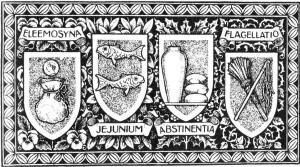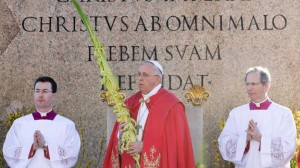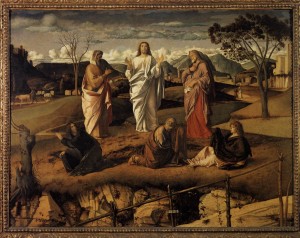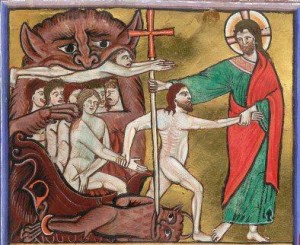 Ash Wednesday the first day of Lent. On this day, the observance of fast and abstinence begins. Pope St. Leo teaches that the main purpose for fasting is not that the body be deprived of food, but that the mind at the same time be withdrawn from wickedness, we should endeavor during Lent, not only to be temperate in eating and drinking, but especially to lead a modest life, sanctifying the days by persevering prayer and devoutly attending the Church’s liturgy.
Ash Wednesday the first day of Lent. On this day, the observance of fast and abstinence begins. Pope St. Leo teaches that the main purpose for fasting is not that the body be deprived of food, but that the mind at the same time be withdrawn from wickedness, we should endeavor during Lent, not only to be temperate in eating and drinking, but especially to lead a modest life, sanctifying the days by persevering prayer and devoutly attending the Church’s liturgy.
Category: Lent & Holy Week
Holy Saturday
By descending into Hell, He made Hell captive. He embittered it when it tasted of His flesh. And Isaiah, foretelling this, did cry: Hell, said he, was embittered, when it encountered Thee in the lower regions. It was embittered, for it was abolished. It was embittered, for it was mocked. It was embittered, for it was slain. It was embittered, for it was overthrown. It was embittered, for it was fettered in chains. It took a body, and met God face to face. It took earth, and encountered Heaven. It took that which was seen, and fell upon the unseen.
Palm Sunday 2015: Pope Francis recommends humility
 At the heart of this celebration, which seems so festive, are the words we heard in the hymn of the Letter to the Philippians: “He humbled himself” (2:8). Jesus’ humiliation.
At the heart of this celebration, which seems so festive, are the words we heard in the hymn of the Letter to the Philippians: “He humbled himself” (2:8). Jesus’ humiliation.
These words show us God’s way and the way of Christians: it is humility. A way which constantly amazes and disturbs us: we will never get used to a humble God!
Humility is above all God’s way: God humbles himself to walk with his people, to put up with their infidelity. This is clear when we read the Book of Exodus. How humiliating for the Lord to hear all that grumbling, all those complaints against Moses, but ultimately against him, their Father, who brought them out of slavery and was leading them on the journey through the desert to the land of freedom.
This week, Holy Week, which leads us to Easter, we will take this path of Jesus’ own humiliation. Only in this way will this week be “holy” for us too!
We will feel the contempt of the leaders of his people and their attempts to trip him up. We will be there at the betrayal of Judas, one of the Twelve, who will sell him for thirty pieces of silver. We will see the Lord arrested and carried off like a criminal; abandoned by his disciples, dragged before the Sanhedrin, condemned to death, beaten and insulted. We will hear Peter, the “rock” among the disciples, deny him three times. We will hear the shouts of the crowd, egged on by their leaders, who demand that Barabas be freed and Jesus crucified. We will see him mocked by the soldiers, robed in purple and crowned with thorns. And then, as he makes his sorrowful way beneath the cross, we will hear the jeering of the people and their leaders, who scoff at his being King and Son of God.
This is God’s way, the way of humility. It is the way of Jesus; there is no other. And there can be no humility without humiliation.Following this path to the full, the Son of God took on the “form of a slave” (cf. Phil 2:7). In the end, humility means service. It means making room for God by stripping oneself, “emptying oneself,” as Scripture says (v. 7). This is the greatest humiliation of all.
There is another way, however, opposed to the way of Christ. It is worldliness, the way of the world. The world proposes the way of vanity, pride, success… the other way. The Evil One proposed this way to Jesus too, during his forty days in the desert. But Jesus immediately rejected it. With him, we too can overcome this temptation, not only at significant moments, but in daily life as well.
In this, we are helped and comforted by the example of so many men and women who, in silence and hiddenness, sacrifice themselves daily to serve others: a sick relative, an elderly person living alone, a disabled person…
We think too of the humiliation endured by all those who, for their lives of fidelity to the Gospel, encounter discrimination and pay a personal price. We think too of our brothers and sisters who are persecuted because they are Christians, the martyrs of our own time. They refuse to deny Jesus and they endure insult and injury with dignity. They follow him on his way. We can speak of a “cloud of witnesses” (cf. Heb 12:1).
Let us set about with determination along this same path, with immense love for him, our Lord and Saviour. Love will guide us and give us strength. For where he is, we too shall be (cf. Jn 12:26). Amen.
Olivier Clement on Lent
These thoughts of an esteemed theologian, Olivier Clement seem worth sharing on season of Lent:
“Asceticism can only be understood in the perspective of the resurrected, liturgical body. Asceticism signifies the effort to strip away our masks, those neurotic identities that usurp our personal vocation. It is an effort based not on will-power, but on a ceaseless abandonment of oneself to grace…. Asceticism is the struggle, the self-abandonment of openness and faith, which allows the Spirit to transform the anonymous body of our species into a body of ‘language’ that expresses both the person and communion among persons. Thanks to this ascetic struggle, we are gradually transformed from an acquisitive body, that treats the world as its prey, into a body of celebration, that unites itself to the ecclesial liturgy and thereby to the cosmic liturgy.”
Olivier Clement (1921-2009) was a French Eastern Orthodox theologian 1921-2009. He was a Professor at St.Serge in Paris and the author of many books and articles and was the editor of the magazine Contacts.
Laetare Sunday
Today, the 4th Sunday of Lent–Laetare Sunday we here from the gospel of Saint John (3:14-21). One among several sentences from the gospel stand out: “Whoever believes in him will not be condemned, but whoever does not believe has already been condemned, because he has not believed in the name of the only Son of God.” It is the Son of God who saves me from me and offers me a terrific gift: heaven.
A reflection from Saint John Chrysostom gives persepctive: “The text, ‘God so loved the world’, shows such an intensity of love. For great indeed and infinite is the distance between the two. The immortal, infinite majesty without beginning or end loved those who were but dust and ashes, who were loaded with ten thousand sins but remained ungrateful even as they constantly offended him. This is who he ‘loved’! For God did not give over a servant, or an angel or even an archangel but ‘his only begotten Son.’ And yet no one would show such anxiety even for his own child as God did for his ungrateful servants.”
The Big Three of Lent
I saw this post the other day, “The Big Three of Lent.” Thought I would share:
Fasting is not just a spiritual diet. By denying our bodies, our physical hunger reminds us of the hunger of our souls for God, our longing for a deeper relationship with Our Lord.
Almsgiving teaches us to separate ourselves from material possessions. By freely giving of our money and possessions we learn to trust the Lord more deeply for our own daily needs.
Prayer during Lent is a way to stir up our love and enthusiasm by having a deepening conversation with the Almighty. Remember that the light of God’s love shines more brightly in the darkness of the recognition of our own sinfulness.
Third Sunday of Lent
 In many parishes with an active and faithful Rite of Christian Initiation of Adults (RCIA) program you would have celebrated the first of three scrutiny rites. The gospel reading would have been the story of the Woman at the Well. This particular bible narrative shows the intimacy and mercy of God in the life of a woman in great need. The gaze of Christ is what heals because he names the sin and disorder, calls the woman to drink of refreshing water and heals her name.
In many parishes with an active and faithful Rite of Christian Initiation of Adults (RCIA) program you would have celebrated the first of three scrutiny rites. The gospel reading would have been the story of the Woman at the Well. This particular bible narrative shows the intimacy and mercy of God in the life of a woman in great need. The gaze of Christ is what heals because he names the sin and disorder, calls the woman to drink of refreshing water and heals her name.
A scrutiny is a liturgical rite of the Church which occurs on the Third, Fourth, and Fifth Sundays of Lent. Those receiving Baptism, Confirmation and Eucharist would participate in these rites at the Sunday Eucharist. The scrutinies lead all of us to a deeper change-of-life by looking at oneself and working on repentance of sin. There are special prayers of exorcism. We typically think of an exorcism for those who are possessed by the devil in some outrageous way. But an exorcism is used to be delivered from evil, sin, weakness of will and mind, and disorder. All sin needs to be exorcised; sin comes from the devil.
The rites of exorcism are meant for healing and turning the person from sin so that the person can live in the light. The goal is to set one’s life aright with God. No good Christian can be in relationship with God and with Satan. Hence, the rites of the RCIA scrutinies aim is to deepen their resolve to hold fast to Jesus Christ, and to give definition to their decision to love God above all things for all time. Likewise, the scrutinies hope to protect those preparing for Easter Sacraments against temptation, and to give them strength in Jesus Christ.
The prayer of the Church is for a true conversion of life for the sake of the Gospel during this Lenten season.
Knowing the Lord as the Apostles
 We are the 2nd Sunday of Lent and the magnificently rich reading from the Gospel of Mark (9:2-10) on the Transfiguration.
We are the 2nd Sunday of Lent and the magnificently rich reading from the Gospel of Mark (9:2-10) on the Transfiguration.
“Jesus took Peter, James, and John and led them up a high mountain apart by themselves. And he was transfigured before them, and his clothes became dazzling white, such as no fuller on earth could bleach them.”
One thing is certain: we can stand looking at the Lord with mouths open; we have to listen to him. Abraham had his vision of God, and listened; Mt. Tabor was the place where Peter, James and John had a unique witness a vision of God. What is your vision of God? What has God said to you today?
Saint Leo the Great reflects:
“The splendor of the Transfiguration clearly and unmistakably reveals the one who had been promised by signs foretelling him under the veil of mystery. As St. John says, ‘The law was given through Moses, grace and truth came through Jesus Christ.’ In him the promise made through the shadows of prophecy stands revealed, along with the full meaning of the precepts of the law. He is the one who teaches the truth of prophecy through his presence, and makes obedience to the commandments possible through grace… When it comes to obeying the commandments or enduring adversity, the words uttered by the Father should also echo in our ears: ‘This is my beloved Son in whom I am well pleased. Listen to him.’”
The meaning of Christ’s temptation
St. Augustine reflects on Mark 1:12-15, today’s gospel in the Novus Ordo:
“Jesus made us one with him when he chose to be tempted by Satan. We’ve heard in the gospel how the Lord Jesus Christ was tempted by the devil in the desert. Certainly Christ was tempted by the devil. In Christ you were tempted, for Christ received his flesh from your nature, but by his own power gained salvation for you; he suffered death in your nature, but by his own power gained life for you; he suffered insults in your nature, but by his own power gained glory for you; therefore, he suffered temptation in your nature, but by his own power gained victory for you.”
Holy Saturday, when the earth trembles and is silent
 Jesus has gone to search for our first parent, as for a lost sheep. “Awake, O sleeper, and rise from the dead, and Christ will give you light!”
Jesus has gone to search for our first parent, as for a lost sheep. “Awake, O sleeper, and rise from the dead, and Christ will give you light!”
An ancient homily for Holy Saturday: “Something strange is happening – there is a great silence on earth today, a great silence and stillness. The whole earth keeps silence because the King is asleep. The earth trembled and is still because God has fallen asleep in the flesh and he has raised up all who have slept ever since the world began. God has died in the flesh and hell trembles with fear…”